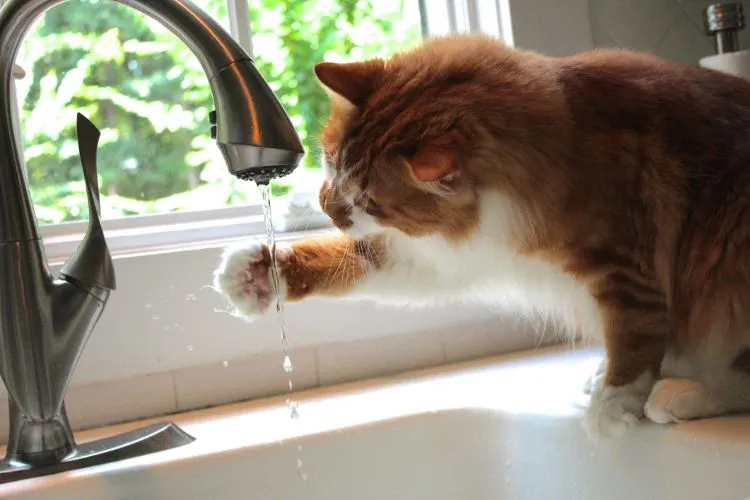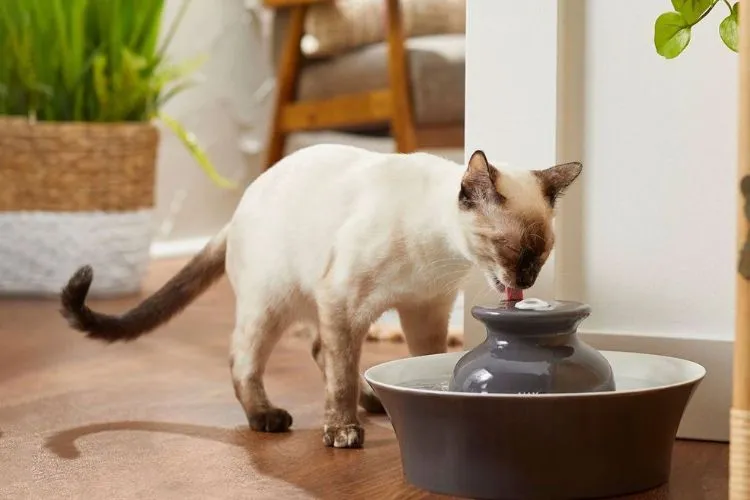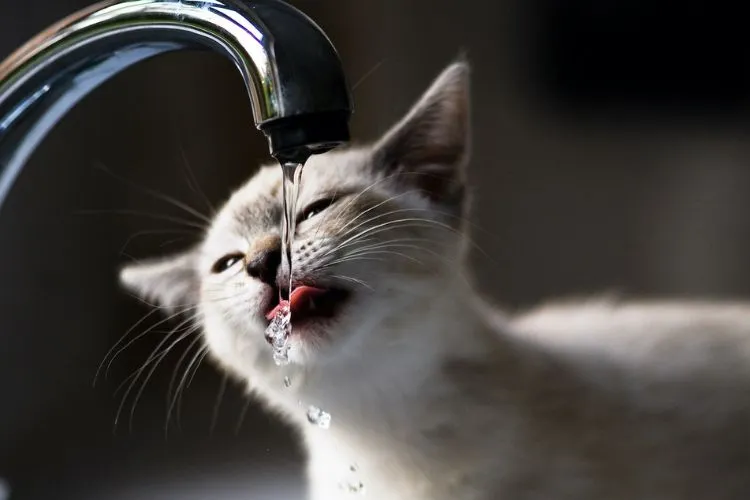Cats are known for their finicky nature, particularly when it comes to what they eat and drink.
It’s crucial to ensure that they stay hydrated since good hydration supports their overall health and prevents various illnesses.
While cats usually get part of their water intake from their food, the water they drink plays an essential role too, especially for those on a dry food diet.
This raises a common question among cat owners: can cats drink filtered water on a regular basis?
This article explores the benefits of providing filtered water to cats, how to choose the right water filter, and additional care to keep your feline friend hydrated and healthy.

💦 Understanding Filtered Water
What Is Filtered Water?
Filtered water refers to tap water that has gone through a process to remove chemicals, organic contaminants, and other residues.
This process can be achieved using different kinds of filters such as carbon filters, which are effective in removing chlorine and improving taste, or more complex systems like reverse osmosis-involves improve the taste of the water and encourage more frequent hydration.
💦 Can Cats Drink Filtered Water?
Filtered water is more than just a simple preference for some cat owners—it represents a proactive approach to pet health care.
Filtering water can remove potentially harmful contaminants that might be found in regular tap water, such as lead, chlorine, and various bacterial contaminants.
Improved Hydration
Cats are naturally low-thirst drive animals, which means they do not get thirsty as quickly as other pets might.
This trait can sometimes lead to inadequate water intake, risking urinary tract diseases and kidney stones. Filtered water often tastes better than tap water, which can encourage cats to drink more frequently and stay hydrated.
Reduced Risk of Disease
Certain contaminants in unfiltered tap water, like heavy metals and chlorine, can pose health risks to cats, potentially leading to long-term health issues.
By using a water filter, these harmful elements are significantly reduced, lowering the risk of illnesses associated with exposure to chemicals and metals.
💦 Choosing the Right Water Filter for Your Cat

Types of Water Filters
There are several types of water filters available on the market, each suited to different needs:
- Pitcher Filters: These are simple, portable, and affordable. They use activated carbon filters to cleanse water of major contaminants.
- Faucet Attachments: These filters connect directly to your kitchen faucet for convenience, providing filtered water on demand.
- Under-Sink Filters: These systems are installed under the sink and can provide comprehensive filtration for all water that passes through the designated faucet.
What to Look for in a Water Filter
When selecting a water filter for your cat, consider the specific contaminants you want to target. Check your local water quality report to identify any pollutants in your area.
Additionally, review the filter’s specifications to ensure it addresses those concerns. Always balance the cost of the filter system with the benefits it offers in terms of contaminant removal.
💦 Safe Practices for Using Filtered Water
Maintenance Is Key
To ensure that a water filter continues to operate effectively, it’s essential to maintain it according to the manufacturer’s instructions. This usually includes regular changing of the filter cartridges to prevent the buildup of bacteria and recontamination of the water.
Proper Storage
If you filter water in large quantities, make sure it’s stored in a clean, sealed container to maintain its purity. Stainless steel or glass are preferred materials for storing water as they do not leach chemicals into the water.
💦 Alternatives to Filtered Water
While filtered water is optimal, there are other safe alternatives:
- Bottled Water: It’s convenient and generally safe but can be expensive and environmentally unfriendly due to plastic waste.
- Boiled Water: Boiling effectively kills pathogens but may concentrate other impurities such as heavy metals, depending on your water source.
Tips for Implementation
- Consider using a cat water fountain equipped with a filter to continuously attract your cat to drink water.
- Regularly observe your cat’s water intake as any sudden changes could be an indicator of health issues.
💦 Signs of Dehydration in Cats
Recognizing the signs of dehydration in cats is crucial for their health and well-being. Signs include lethargy, loss of appetite, dry mouth, depression, elevated heart rate, decreased skin elasticity (when the skin is pulled lightly, it doesn’t snap back quickly), and sunken eyes.
Minor changes in a cat’s hydration status can significantly affect their health, particularly influencing kidney function and urinary health.

Immediate veterinary care is imperative if dehydration is suspected because it can quickly lead to more severe complications, including organ failure.
Treatment may involve the administration of subcutaneous or intravenous fluids to efficiently rehydrate the cat. Early intervention is key to preventing the progression of dehydration and ensuring the best possible outcome for your feline friend.
Vets can also assess underlying causes of dehydration, such a kidney disease or diabetes, which require specific management to prevent recurring issues.
💦 Frequently Asked Questions (FAQs)
Is filtered water jessant for cats compared to tap water?
Yes. Filtered water is safer as it typically contains fewer harmful contaminants than tap water.
Can I give my cat distilled water?
While distilled water is safe, it lacks minerals. It’s fine for occasional use but not recommended as a regular drink due to its lack of electrolytes.
How often should I change the water in my cat’s bowl?
Daily changes are recommended to ensure freshness and to encourage your cat to drink regularly.
Is a Brita filter adequate for my cat’s water?
Yes, a Brita filter or any similar pitcher-type filter can improve the taste and quality of drinking water, making it a good option for cats.
Conclusion:
Choosing filtered water for your cat is a wise decision that can improve their hydration and help prevent diseases related to poor water quality.
It’s also a step towards ensuring that the water your cat drinks is as clean and free from harmful chemicals as possible.

Devon Shorts, a seasoned expert with over a decade of experience in water safety, shares valuable insights on this blog “Aqua Safety Plus”. Trust his expertise to keep your water clean and your family safe.
